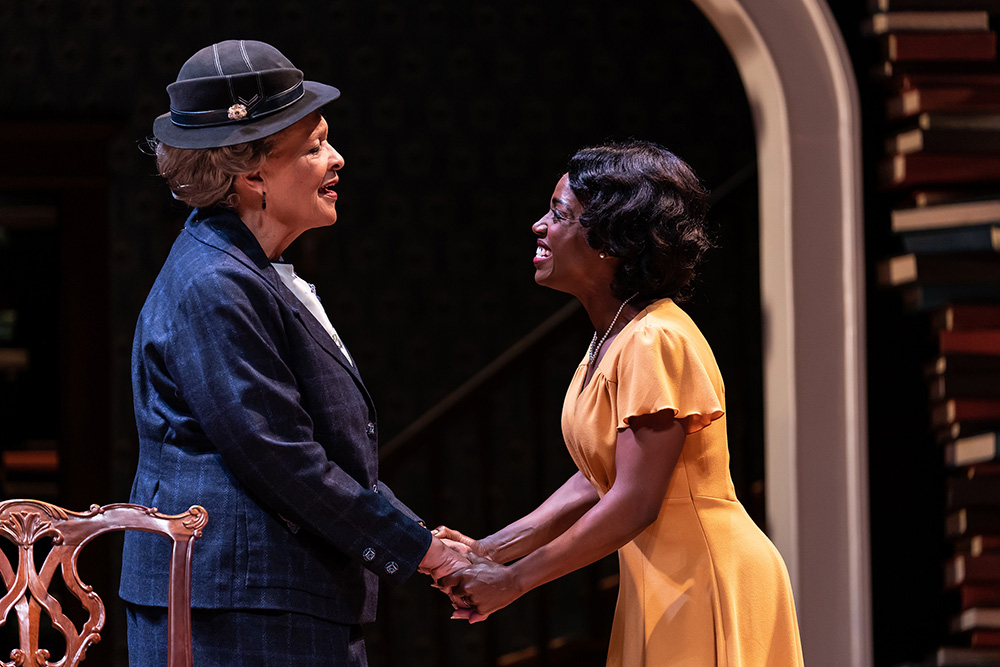Culture
 Franchelle Stewart Dorn as Mary Church Terrell + Felicia Curry as Marian Anderson in "My Lord, What a Night." Photo by Scott Suchman.
Franchelle Stewart Dorn as Mary Church Terrell + Felicia Curry as Marian Anderson in "My Lord, What a Night." Photo by Scott Suchman.
There’s More Than One Way to Fight for Justice in “My Lord, What a Night”
October 9, 2021 @ 12:00pm
“Music connects me to the harmony of the universe,” physicist Albert Einstein tells famed contralto Marian Anderson in Deborah Brevoort’s new drama at Ford’s Theatre.
While there might not seem to be much to connect Anderson, the African-American opera singer, and Einstein, the German-Jewish genius who developed the theory of relativity, the two shared a lifelong friendship, connected by a love of music and Swiss chocolates.
“Great composers pluck the music from the universe,” Einstein observes. “Scientists do the same.”
But it is the more sinister experiences that Anderson and Einstein shared as victims of prejudice and persecution that give meat to “My Lord, What a Night.”
The play begins where their friendship started. In 1937, after performing in Princeton, New Jersey, Anderson was denied lodgings at the Nassau Inn under a “whites only” policy. Einstein witnessed the humiliating incident after attending her concert. He invited her to stay at his house where the pair was joined by two other intellects of the day, African-American civil rights activist Mary Church Terrell and Jewish-American academic Abraham Flexner, the man responsible for bringing Einstein to Princeton when the Nazis made it dangerous for him to return to Germany.
In the privacy of Einstein’s home, while journalists clamor outside, these four share opinions on the racial justice issues burning through America in the lead-up to World War Two. Director Sheldon Epps has assembled a tightly-knit cast for this swift, one-act production performed in only two scenes. This play will be of interest to anyone who appreciates history and as an opportunity to see four brilliant minds in one room tackling the same civil rights issues from completely different — yet valid — perspectives.
Felicia Curry, a familiar face at Ford’s Theatre, plays a restrained and conflicted Anderson. Curry captures the essence of the fiercely private singer who had no interest in becoming a civil rights activist. Anderson only ever wanted to sing and believed that conducting herself with dignity would be enough to counteract prejudice. Her dresses by costume designer Karen Perry lend the play sumptuous sophistication.
Einstein, in contrast, is a firebrand, using his celebrity to draw attention to causes benefiting Jewish and Black populations alike. He signs every petition the NAACP sends his way and he considers it a badge of honor when the FBI places him on their list of radicals.
Einstein is brought to adorable life by Christopher Bloch, who portrays the scientist like a delightful teddy bear. His Einstein is a disheveled genius whose humor brightens the room and whose discarded equations cover tables and chairs throughout his Princeton cottage. Meghan Raham’s set design features the parlor of Einstein’s home against a backdrop of books rising from floor to ceiling at the rear of the stage.
The presence of the other two intellectuals in the room ensures that the conversation never veers too far from the political. Mary Church Terrell, played with appropriate gravitas and dry humor by Franchelle Stewart Dorn, urges Anderson to use her celebrity for the greater good of all Black Americans.
Michael Russotto imparts great complexity to Abraham Flexner, a character whose opinions were as out of step with the others on stage as they are today. His is the perspective of the assimilator. He admits to being embarrassed to be a Jew and he displays an obtuse indifference to the plight of African Americans. His opinions elicited audible boos from the audience the night I attended.
The play culminates with Anderson’s famed 1939 performance in front of the Lincoln Memorial in Washington, D.C., a performance that attracted 75,000 spectators of all races, including African-Americans who had been unable to see her perform due to the segregationist policies of the time. Millions more listened at home.
But it was in the lead up to this iconic event that “My Lord, What a Night” failed to hit the mark for me. The play jumped too quickly from the idea of performing a concert to the actual concert itself. Lost was the opportunity to share the fascinating details behind this historic endeavor.
Anderson’s concert at the Lincoln Memorial was a truly momentous event in 20th-century music and a racial justice victory for America. The Daughters of the American Revolution’s refusal to allow Anderson to perform at Constitution Hall led First Lady Eleanor Roosevelt to resign from the organization and push the Roosevelt administration to sponsor the concert at the National Park – land controlled by the federal government and therefore not subject to Washington D.C.’s racist laws. Spending more time on the events leading up to this concert would have allowed the concert itself to shine even more.
Instead, everything wrapped up a little too quickly, with two of the characters having changes of heart that seemed difficult to believe given the suddenness of their decisions.
But setting that gripe aside, there are plenty of reasons to see this production which seems tailor made for a Ford’s Theatre audience. Funny, engrossing performances, beautiful costumes and scenery, and a story of American heroism all add up to an inspiring evening in the nation’s capital.
“My Lord, What a Night” plays through October 24. The production will be available for streaming on demand from October 11 through November 4. The play runs 100 minutes with no intermission. Purchase tickets here.
Ford’s Theatre: 511 10th St. NW, DC; 202-347-4833; fords.org // @fordstheatre







